Best Thunderbolt 4 hubs and docking stations in 2024
Unlock the full potential of your devices with the best Thunderbolt 4 docks on the market.
Thunderbolt 4 docks and hubs are gradually replacing their Thunderbolt 3 predecessors, offering superior performance and compatibility with a wide range of interfaces. The best Thunderbolt 4 docks may come with a higher price tag compared to a standard USB-C dock or an older Thunderbolt 3 dock, but the investment is well worth it.
Thunderbolt 4 isn’t just a standard, its interoperability with USB-C broadens the range of devices you can connect with. Even if your PC is equipped with Thunderbolt 3, USB 4, or USB-C, many of these Thunderbolt 4 docks will offer additional ports, charging capabilities, and more. If you’re looking to transform your laptop into a full-fledged workstation, join us as we explore the best Thunderbolt 4 docks available in the market right now.
The quick list

Best overall
The best Thunderbolt 4 dock comes with the most ports, including DisplayPort and a UHS-II capable microSD card reader. With up to 98W power delivery, this Thunderbolt 4 dock truly stands out as a winner. However, be aware that availability may be inconsistent due to high demand.
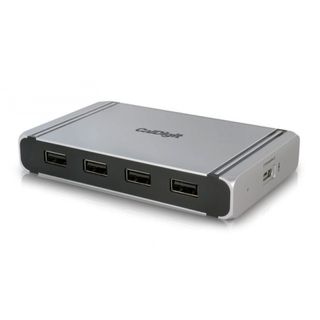
Best compact
A compact and affordable Thunderbolt 4 dock that broadens your USB and Thunderbolt connectivity, albeit without the addition of Ethernet. This Thunderbolt 4 dock is a fantastic purchase for those on a tighter budget
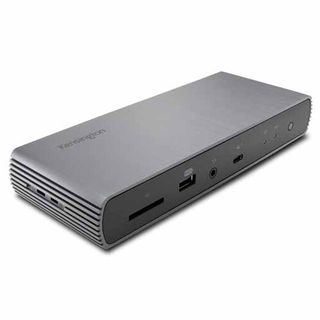
Best for mounting
With up to 90W of power delivery, three downstream Thunderbolt ports, USB-A, and Ethernet, this Thunderbolt 4 dock excels in performance. However, the real selling point of this best Thunderbolt 4 dock is its mountable design, making it the top choice for those seeking a space-saving solution.

Best for gamers
Absolutely, gamers require robust connectivity as well. Razer’s Thunderbolt 4 dock not only enhances your setup with a touch of RGB, but it also prioritizes the expansion ports that truly count. With Thunderbolt, USB, and Ethernet capabilities, this best Thunderbolt 4 dock for gamers is ready to meet your needs. Plus, it can support dual 4K60 displays, adding another dimension to your gaming experience.

Best value
While this Thunderbolt 4 dock may be cheaper, it doesn’t skimp on the features. It comes equipped with a variety of ports, including the latest UHS II spec microSD and Ethernet. Plus, with up to 90W power delivery, this dock ensures your laptop stays charged while connected.
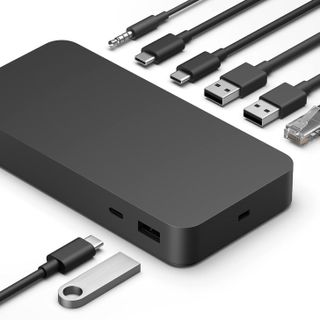
Best for Surface
Surface has finally embraced Thunderbolt 4 docks, with the only drawback being the lack of backward compatibility with older Surface Connect ports. Apart from this, this compact dock is the ideal accessory for a modern Surface device.
Best overall
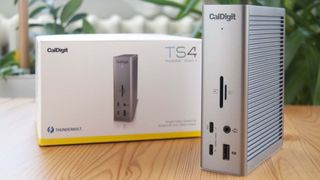
Specifications
Reasons to buy
Reasons to avoid
The CalDigit TS4 Thunderbolt 4 dock is the successor to the highly acclaimed CalDigit TS3 Plus. We’ve been using this best Thunderbolt 4 dock regularly since our CalDigit TS4 review, and I can still say it remains a standout in modern docking solutions. It follows a similar design as the TS3 Plus, with three solid aluminum pieces held together with four robust screws. It has a rubber pad on the bottom for a vertical orientation, and rubber feet can be added to the ribbed sides if you'd like to use it horizontally.
The TS4 boasts the highest number of ports among any Thunderbolt 4 docks currently available. The 18 total ports are divided between the front and back of the dock, with the host Thunderbolt 4 port and two additional downstream Thunderbolt 4 ports located at the back. While you might wonder why there aren’t four TB4 ports, one was traded for a native DisplayPort 1.4 connection. The back of the dock also includes four USB-A (10Gbps), 2.5 Gigabit Ethernet, USB-C (10Gbps), and dual 3.5mm audio ports. A Kensington lock slot adds an extra layer of security for office use.
The front of the dock has another USB-A port, a 3.5mm audio combination, dual USB-C ports (one with 20W of charging power), and UHS-II SD and microSD card readers that can be used simultaneously. The dock supports dual 4K display, each at a 60Hz refresh rate or an 8K display at a 60Hz refresh rate. When connected to the host laptop, the dock can deliver up to 98W of power.
Best compact

Specifications
Reasons to buy
Reasons to avoid
The CalDigit Element Hub is another exceptional Thunderbolt 4 dock solution by CalDigit, a brand that consistently ranks high in our roundup of the best laptop docking stations. Our CalDigit Element Hub review revealed it to be the perfect high-performance accessory capable of handling everything from an eGPU to a RAID storage setup to multiple high-resolution displays.
Smaller in size and more affordable than other Thunderbolt 4 dock options, the Element Hub is an excellent choice if you’re short on desktop space. It does require a sizable AC adapter, so it’s not the most portable option.
The host laptop connects to the side of the dock, providing access to seven additional ports. The front edge features four USB-A 3.2 (Gen 2) ports with 10Gbps speeds and 7.5W of charging power. The back edge houses the AC input and three Thunderbolt 4 ports with 40Gbps speeds and 15W of charging power. Note that the host laptop can receive up to 60W of charging power when connected.
The Element Hub can be daisy-chained with a larger dock (like the TS3 Plus or TS4) for even more ports, and its reversible design offers extra flexibility for your desk setup. In terms of monitor support, the Element Hub can handle up to dual 4K displays at 60Hz in both extended or mirror modes, a single 8K display at 30Hz, or a 5K Thunderbolt display at 60Hz. If you’re connecting high-speed external storage, you can expect read speeds of up to 3,000MB/s. As long as you’re not in need of a wide variety of ports and are looking to add USB-A and Thunderbolt 4, this dock is a great, cost-effective choice compared to many other options.
Best bracket mounting

Specifications
Reasons to buy
Reasons to avoid
The SD5700T Thunderbolt 4 dock is another great choice if you're looking for a permanent solution and have ample space on your desk. It's a bit larger than the Element hub, but it adds a better mix of ports. While it doesn't have as many ports as our top pick, it doesn't cost nearly as much. If you need Ethernet, a UHS-II SD card reader, or a 3.5mm audio jack, this dock is no doubt going to make a great choice. In my Kensington SD5700T review, I note that the two lock slots and bracket mounting option make it ideal for a public office where tons of desk space isn't always provided.
It connects to the host with Thunderbolt 4 and adds 10 ports, including one USB-A 2.0, three USB-A 3.2 (Gen 2), and three downstream Thunderbolt 4. You can get up to 90W charging power back to the laptop (great for PCs with dedicated GPUs that require more power), and there's support for a single 8K display at 30Hz or dual 4K displays at 60Hz.
For some extra security, the dock includes a Kensington lock slot and a Kensington Nano lock slot. If you don't want to keep the aluminum dock on your desk, there are mounting solutions available. There is also an SD5750T designed specifically for the newest Surface PCs, including the Surface Pro 9 and Surface Laptop Studio. It's one of the best Thunderbolt 4 docking stations if you've invested in the latest from Microsoft.
Best for gamers
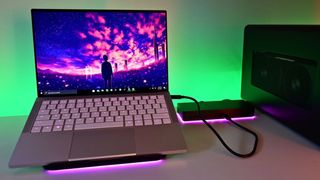
Specifications
Reasons to buy
Reasons to avoid
Razer seems to have a version of just about any peripheral you can think of, including a Thunderbolt 4 dock. True to Razer's vision, it's a high-performance option that's soaked with RGB. Yes, even your docking station can have a sweet Chroma underglow to make your office look that much cooler. After testing the dock for a couple of weeks for our Razer Dock Chroma review, it was clear that this is the right accessory for gaming laptops.
The dock follows nearly the same port setup as the Kensington SD5700T, though it drops the wimpy USB-A 2.0 port on the front. Connecting with Thunderbolt 4, you get access to three downstream Thunderbolt 4 ports, 3.5mm audio jack, a UHS-II SD card reader, three USB-A 3.2 (Gen 2), and up to 90W charging power to the host. If the regular black color doesn't suit your setup, there's also a Mercury option now available.
Razer's Chroma RGB syncs up with your other compatible accessories and offers 16.8 million colors for you to mess around with. Note that the dock has a relatively short one-year warranty.
Best value

5. OWC Thunderbolt 4 Dock
Specifications
Reasons to buy
Reasons to avoid
OWC's Thunderbolt 4 Dock is in many ways almost identical to Kensington's SD5700T, right down to port selection, port layout, and lock slots. A notable difference, however, is the price. It used to be a lot more pronounced, but after the SD5700T's price drop it's not as big of a deal. Why the price discrepancy? OWC's dock has a lot more plastic and a shorter two-year warranty. If those things don't matter, you're going to get the same connectivity for a lot less money.
The dock connects to the host laptop with Thunderbolt 4 and provides up to 90W charging power. There's a USB-A 2.0 port on the front, flanked by a UHS-II SD card reader and 3.5mm audio jack. The back edge has three downstream Thunderbolt 4, Ethernet, three USB-A 3.2 (Gen 2), and the AC hookup. It will handle dual 4K displays at a 60Hz refresh rate or a single 8K display at 30Hz.
A Kensington lock slot and Kensington Nano lock slot are included on the side. The first production run of this dock sold out fast, but availability is better now.
Best for Surface

6. Microsoft Surface Thunderbolt 4 dock
Specifications
Reasons to buy
Reasons to avoid
The Surface Dock as a product has been around for many years. But until this latest model, it was always locked behind the Surface Connect port, meaning unless you had a Surface, you couldn't use it at all. The latest Surface Dock uses Thunderbolt 4, so for the first time, anyone can pick one up.
You'd be right for doing so, too. As far as Thunderbolt docks go this one is on the more portable side, without sacrificing too much on connectivity. Perhaps the only downside is that while it is capable of hosting a pair of 4K displays at 60Hz, the Surface Thunderbolt 4 Dock doesn't have HDMI or DisplayPort. That means you'll either need a special cable or an adapter if you don't have a USB-C/Thunderbolt enabled external display.
Otherwise, there's a raft of USB-C and USB-A ports, and with up to 96W pass through you'll be able to keep your Surface powered up while its connected. It's also nice to see that Microsoft added this dock into its program to use a percentage of recycled ocean plastic in making it. 20% of the dock comes from these recycled materials, so it's also doing its bit to help the environment, too.
FAQ
What is a Thunderbolt 4 dock and why might you need one?
The purpose of a Thunderbolt 4 dock is expansion. Where desktop PCs traditionally have a large array of ports to connect external devices to, laptops usually don't. That's where Thunderbolt 4 steps in. By using the USB-C connector, it's possible to have Thunderbolt 4 even on the thinnest of laptops. Connecting a dock allows your laptop to use a single cable for power, display output and any number of USB peripherals, adding in functionality you don't have included as standard.
What's the difference between USB 4 and Thunderbolt 4?
Thunderbolt 4 and USB 4 are easy to confuse, not least because both offer the same USB-C connector and the same maximum data transmission performance (40Gbps). Though USB 4 can only send at this rate over 1 meter, half that of Thunderbolt 4. USB 4 is even based on the Thunderbolt protocol, but the two are not the same. They're just very similar.
The minimum requirements for USB 4 are much lower at 20Gbps, while Thunderbolt 4 is at 32Gbps. Likewise, the minimum power requirements for Thunderbolt 4 are double those of USB 4 at 15W versus 7.5W.
When it comes to docks, some Thunderbolt 4 docks may well be fully or almost fully compatible with USB 4, but it's not necessarily guaranteed. Before buying, it's always worth double-checking your own hardware and ensuring you get what you're looking for.
Do USB-C hubs work with Thunderbolt 4?
No. USB-C hubs and Thunderbolt 4 share a similar physical connector, but they serve different purposes and you need to ensure the dock you are purchasing is advertised as Thunderbolt 4 if you need this compatibiliy. Standard USB-C hubs are much cheaper and do not support Thunderbolt-specific features like higher power delivery, transfer speeds and video delivery through one single cable.
Is Thunderbolt 4 worth it?
Thunderbolt 4 is considerably more expensive than USB-C, so its individual worth depends on your specific needs and usage. Thunderbolt 4 offers high-speed data transfer of up to 40 Gbps, which is essential for working with large files, high-resolution videos, and demanding applications. Additionally, if you are a creative professional or designer, the ability to run two 4K monitors simultaneously will be appealing.
Get the Windows Central Newsletter
All the latest news, reviews, and guides for Windows and Xbox diehards.

Richard Devine is a Managing Editor at Windows Central with over a decade of experience. A former Project Manager and long-term tech addict, he joined Mobile Nations in 2011 and has been found on Android Central and iMore as well as Windows Central. Currently, you'll find him steering the site's coverage of all manner of PC hardware and reviews. Find him on Mastodon at mstdn.social/@richdevine
- Jennifer Young
- Rebecca SpearGaming and News Editor
